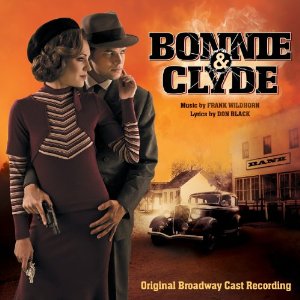I have to say I’m really excited by the high number of cast recordings that have emerged this season, from Broadway, off-Broadway and the Encores! season. If rumors of a Leap of Faith cast album are true, we’ll have recorded accounts of all Tony-nominated Best Musicals and Musical Revivals, among others. In the midst of this busy season, a brand label has emerged on the scene. Broadway Records is making its first foray into the cast recording world with three releases of note: two original Broadway cast albums and a star replacement EP. All three are beautifully produced and handsomely packaged, with color photographs. The two full cast albums contain lyrics, synopses and essays from the creators.
Bonnie & Clyde didn’t do much for me in the theatre, but it makes for a surprisingly entertaining listen. I still feel that Wildhorn’s music was the least of that show’s problems. Don Black’s lyrics remain a mixed bag, but that is buoyed by some wonderful performances especially the four principals. Laura Osnes’ performance of “How About a Dance?” is worth the price of the record. Some numbers are duds (including the act two opener “Made in America”), but for the most part the cast album makes a better case for the show than the show itself! In fact, separating the score from that terrible libretto is probably the best way to experience Bonnie & Clyde. Included is a bonus track of the cut song about Clyde’s impotency, “This Never Happened Before” (just be warned, it’s one that cannot be unheard).
How to Succeed in Business Without Really Trying has ended its run at the Al Hirschfeld Theatre, but that shouldn’t stop you from hearing the third and final Finch, Nick Jonas, on this new 5 track EP. I am only familiar with Mr. Jonas from what I had seen of the Les Miserables anniversary concert, where his performance as Marius was strained with pop mannerisms and was rather uncomfortable to watch. However, his performance as Finch on record is a far cry from that; Jonas is affable and sings delightfully. He sounds much more at ease when not trying to do that straight-tone pop thing they expect of the kids these days. The tracks include “How to Succeed,” “The Company Way” (with Rob Bartlett), “Rosemary” (with Rose Hemingway), “I Believe in You” and “Brotherhood of Man.”
“So give them Lysistrata, and I wish them lots of luck.” So Carmen Bernstein sings in Curtains. She’s not far off the mark, as far as musicalizing Aristophanes’ bawdily enterprising heroine is concerned. There was the 1961 musical The Happiest Girl in the World, which combined Offenbach’s music with Yip Harburg’s lyrics, that lasted 97 performances. Then there was the much-reviled play-with-music adaptation of the play in 1972 starring Melina Mercouri. And while it had some ardent admirers, including Ben Brantley, Lysistrata Jones wasn’t long for the Broadway stage. I missed seeing Lyssie Jones but the early closing of the show allowed the producers to make this original cast album which will no doubt give this show a cult following post-Broadway. This adaptation involves a perpetually losing college basketball team, and the head cheerleader (the dynamite Patti Murin) withholding sex from the players until they win a game. The score (by Lewis Flinn) is rather tuneful, engaging and at times just fun (and occasionally some of librettist Douglas Carter Beane’s work shines through). Included is a bonus track of the show’s inspirational “Hold On” sung by Jennifer Holliday with the cast.
With these three marvelous releases, I look forward to hearing what Broadway Records has to offer in the future. (Crossing fingers for an EP of Victoria Clark’s Sally in Follies).
